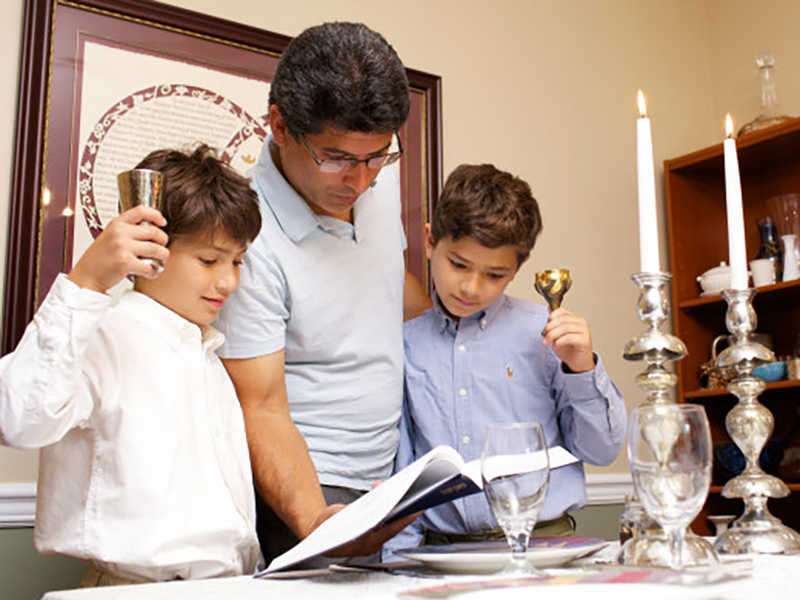
Recently, my daughter and I had an exchange that felt like we were enacting an ancient script between parents and teenagers. It involved phrases like, “As long as you’re under my roof” (me), and, “I didn’t ask to be under this roof” (her). It also left me wondering where on earth this script comes from, and how I ended up with the parental role.
This week’s parashah, B’haalot’cha, provides some answers. God and the people of Israel are caught up in the same script — with the additional complication that Moses is stuck in the middle. The people are tired of manna: they yearn for the food of Egypt and cry out for meat. Moses turns to God in utter exasperation, asking:
Did I conceive all this people, did I bear them, that You should say to me, "Carry them in your bosom as a nurse carries an infant [or: as a nursing father bears a suckling child]?"… Where am I to get meat to give all these people, when they whine before me and say, "Give us meat to eat!" (Numbers 11:12-13)
God then tells Moses to appoint 70 elders to help him bear the load, like the proverbial village that is needed to raise a child. And then God lashes out against the people in anger:
The Eternal will give you meat and you shall eat. You shall eat not one day, not two, not even five days or ten or twenty, but whole month, until it comes out of your nostrils and becomes loathsome to you. For you have rejected the Eternal who is among you, by whining before God and saying, "Oh, why did we ever leave Egypt?" (Numbers 11:18-20)
As it turns out, God does not even have patience to wait 30 days of carnivorous frenzy to strike the people down. Instead, they succumb to a plague while “[t]he meat was still between their teeth, nor yet chewed” (Numbers 11:33). I must admit this passage captured by imagination as a child and may have contributed to my own teenage vegetarian rebellion.
Psychologist Wendy Mogel, in The Blessing of a B Minus (Scribner, 2010), cites the understanding that the wilderness is “the adolescence of the Jewish people” (Mogel, p.3). Her insight into teenagers also gives us insight into the Israelites in this parashah: “Just when it seems that their entire future is riding on their good sense and good behavior, they become rude, disrespectful, and ungrateful” (Mogel, p.16). Their rebelliousness is easy to understand. They are under constant surveillance, with God’s presence as a cloud by day, and a fire by night (Numbers 9:15-23); their grandparent-figure, Moses’ father-in-law, has just left to go back home (Numbers 10:29-32); and as Gersonides (French, 14th century) notes, they feel like, “God does not hear what goes on down here and knows nothing of it.” In other words, God just doesn’t understand.
Even the specific scenario in B’haalot’cha is familiar from many contemporary dinner tables. The Israelites do not want to eat the food that God has provided. As scholar Ilana Pardes aptly observes, “The official parental line defines manna as a divine gift of unsurpassable value and taste, but the people, at this point, perceive it as the very opposite…” in response to which, “[God will] show them the wonders He can cook up” (Pardes, The Biography of Ancient Israel, University of California Press, 2000, p. 53). Against Mogel’s advice to parents, God gets drawn into the argument, and it escalates.
In all this, Moses is struggling with the tension of loving and letting go. The answer to his question: “Did I conceive these people?” is, in a way, yes. Aaron Wildavsky’s study on Moses and leadership is entitled, The Nursing Father (University of Alabama Press, 1984). In it, he argues that the essence of Mosaic leadership is, like a parent, to make himself unnecessary: “To be a ‘nursing father’ — knowing that the child may die, will probably rebel, and must be allowed to make history on its own” (Wildavsky, p.167). At the same time, though, Moses and God are challenged to love this difficult people, unconditionally. The Netziv (Lithuanian, 19th century), a rabbi who knew a lot about leadership, gives us this striking analogy:
As a nursing father bears a suckling child… (Num. 11:12). The Talmud states (Sanhedrin 8): “It is the responsibility of the community leader to carry the community. To what extent? As a nursing father bears a suckling child. In other words, we know that even if a suckling child dirties the person carrying it or slaps him in the face, the person does not, Heaven forbid, drop the child, but continues to carry it. The same must be true for leaders of the Jewish community. Even when they members of the community bother and humiliate them, they must love them and pray for them. (Torah Gems [Itturei Torah], v.3, Yavneh Publishing, 1998, p.51)
The Israelites are ungrateful and insatiable — and yet, they are entirely developmentally appropriate, on this journey between the forced childhood of Egyptian slavery and the adulthood of the Promised Land.
Because the Torah is the narrative of the Israelite people as a whole, the plague that wipes out thousands does not end the story. But it is worth noting how B’haalot’cha ends. Following the rebellion of the people, Miriam and Aaron rebel against their brother, challenging his claim to authority. In light of the people’s rebellion, this part stands out: Moses, attacked even by his siblings, decides to forgive. When Miriam is struck with leprosy, he prays for her healing, in the first such prayer in the Torah: El na r’fah na la, “Please, God, heal her now” (Numbers 12:13).
Some commentators suggest Moses prays with heartfelt passion; others see more ambivalence in the brevity of his words. Whatever his motivation, his action reflects not strict judgment, but compassion. The relationship outweighs the offence. Like God facing the obstreperousness of the Israelites, Moses has every right to respond with anger, yet he chooses to move forward. We are left with the understanding that the relationships that matter most often are the hardest to sustain. But after this disastrous rest stop, the family road trip through the wilderness goes on.
Rabbi Lisa Grushcow, D. Phil., is senior rabbi at Temple Emanu-El-Beth Sholom in Montreal, Canada. Rabbi Grushcow is the author of Writing the Wayward Wife: Rabbinic Interpretations of Sotah, the editor of The Sacred Encounter: Jewish Perspectives on Sexuality, a contributor to The Torah: A Women’s Commentary, and a regular columnist with the Canadian Jewish News. She serves as co-president of the Montreal Board of Rabbis.

Rabbi Grushcow sees B’haalot’cha as a parental negotiation-gone-wrong between God and the Israelites, and I do agree that this is one of the more concrete examples of this kind of relationship in the Torah. And yet, God's response can be, for us, a reminder that gratitude must be taught and reinforced.
Sure, the Israelites were acting fairly rebellious and whiny. But think about their previous situation: their Egyptian overlords would give them only what was necessary to keep them alive and working. There was no "gifting" and no "loving" and no "relationship-building." These things take time to adapt to and to understand. The Israelites weren't quite ready to understand the beauty of God's gift, and God isn't ready to teach them about the value of gratitude. Much like children who need a prompt to say, "thank you," so too do the Israelites need to learn not only to say the words, but also to experience the feeling of gratitude.
There's a story about Rabbi Israel Salanter, the founder of the Mussar movement, who inquires as to why a cup of coffee in a restaurant is so expensive. He is reminded by the owner that while coffee is, in fact, merely beans and water, the experience of drinking the coffee in the restaurant with its fine linen, delightful ambiance, and excellent service is worth the money. Rabbi Salanter expands this idea to teach a better understanding of gratitude for something as simple as water; we are not grateful only for the creation of water but for the air that helps us to breathe as we drink the water, the way the water flows into the vessel, and even the singing of the birds as we drink the water - all of this is included in our gratitude for something as ubiquitous as water.1
The Israelites still see the manna as merely a means of nourishment provided to them by a source with whom they don't yet have a long history of a loving relationship. They aren't quite ready, unlike Rabbi Salanter, to see the deeper message in the gift of the manna. Eventually, they will get there. Just like our children who need to be reminded, "what do you say?" Reading over this story of childish ungratefulness only serves to show us just how very far we have come, and of course, how very far we can continue to grow.
1. This story is from “Tevunah,” by Rabbi Yisrael Shlomo Gordon, quoted in "Torat Yisrael M'Salant" and was received in a lesson by Alan Morinis, founder of the Mussar Institute.
Rabbi Phyllis A. Sommer, RJE is director of congregational learning at Am Shalom in Glencoe, IL.
B’haalot’cha, Numbers 8:1−12:16
The Torah: A Modern Commentary, pp. 1,075−1,100; Revised Edition, pp. 950−973
The Torah: A Women’s Commentary, pp. 843–868
Haftarah, Zechariah 2:14−4:7; The Torah: A Modern Commentary, pp. 1,259−1,261; Revised Edition, pp. 974−976
Explore Jewish Life and Get Inspired
Subscribe for Emails

